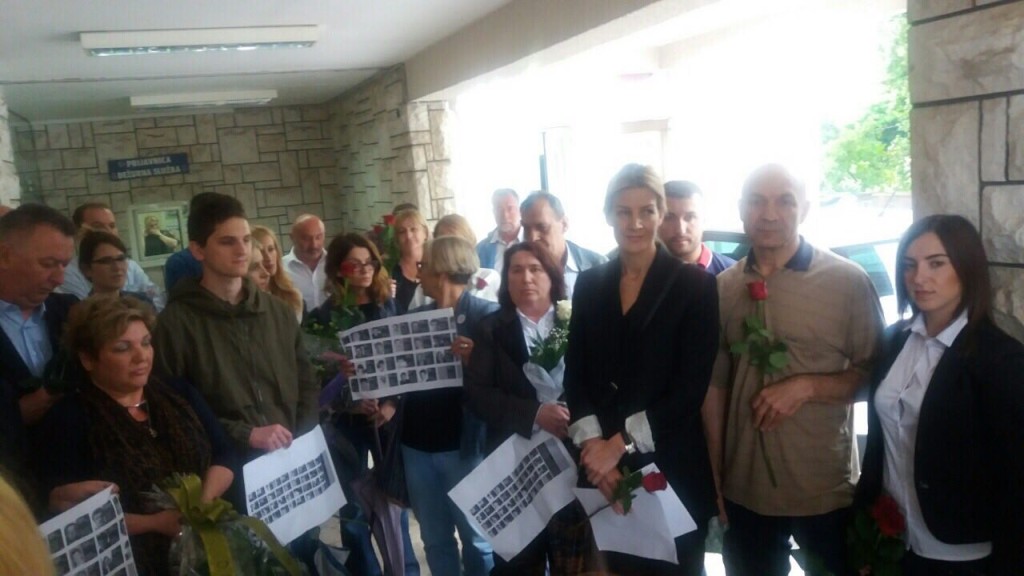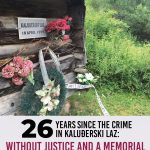3/5/2017 WORLD PRESS FREEDOM DAY IN MONTENEGRO
04/05/20176/6/2017 CALL FOR EXTENSION OF PUBLIC DEBATE ON THE DRAFT LAW ON AMENDMENTS TO THE LAW ON SOCIAL AND CHILD PROTECTION
06/06/201725/5/2017 COMMEMORATION OF 25 YEARS OF DEPORTATION OF REFUGEES FROM MONTENEGRO
 “Unfortunately not one of NGOs’ initiatives has been accepted to date and this quarter of a century of deportation we again mark without punishment, a Day of Remembrance, a monument and without police apology for illegal deportation of refugees,” said Gorjanc Prelević.
“Unfortunately not one of NGOs’ initiatives has been accepted to date and this quarter of a century of deportation we again mark without punishment, a Day of Remembrance, a monument and without police apology for illegal deportation of refugees,” said Gorjanc Prelević.
The 25th anniversary of the deportation of Bosnian refugees from Montenegro, most of which were later murdered, was marked by remembering the victims and laying flowers in front of the main entrance to the Security Center Herceg Novi in the presence of the victims’ families.
Tea Gorjanc Prelević, HRA executive director, said that NGOs which for years point to the war crime from 1992 were doing what was the duty of the state and highlighted that this war crime still remains unpunished. Gorjanc Prelević claims that acquittal of the accused participants in the deportation, based on the fact that Montenegro was not officially participating in the war in Bosnia and Herzegovina, has no connection with international humanitarian law and justice. “I think that this verdict is, actually, a measure of a long journey that still lies ahead of Montenegro before realising of the rule of law. And this belongs to very specific objectives that Montenegrin citizens must expect from their state, as does the EU. The Special Prosecutor’s Office has a duty to fight against impunity of this crime especially since their colleagues assisted in its execution in 1992”, HRA executive director concluded.
Gorjanc Prelević reminded that in May 1992 the Montenegrin police illegally detained at least 66 civilians who fled to Montenegro from the war-torn Bosnia and Herzegovina, and handed them over as hostages to the Bosnian Serbs Army as hostages for the exchange of prisoners of war. “On 25 May 1992, one group of illegally detained refugees was transported by bus from the assembly center at the police station in Herceg-Novi to the KPD Foča, which already had all the characteristics of a concentration camp for non-Serb population, as determined in the judgment of the Hague tribunal against the warden of Foča prison, Milorad Krnojelac. Only a few of them survived torture to which they had been there exposed. Two days later, on 27 May 1992, another group of arrested refugees was transported by bus from Herceg-Novi to an unknown location to eastern Bosnia “where they were supposed to become a part of the group of Muslims for exchange for imprisoned Serbian Territorial Defense fighters. Most of them were immediately killed, others were killed in the camps, and only 12 survived torture and were exchanged in the end. The exact place where some of the victims deported from Herceg Novi on 27 May 1992 were killed remains unknown”, said Gorjanc Prelević.
“Unfortunately not one of our initiatives has been accepted to date and this quarter of a century of deportation we mark without determined criminal responsibility, a Day of Remembrance, monument and without police apology for the abuse of police powers during deportation of refugees” said Gorjanc Prelević.
A Member of the Council for Civil Control of the Police Aleksandar Saša Zeković recalled to the initiative for the Montenegrin police to apologize for illegal action during the arrest and extradition of refugees to their enemy’s army in the Serbian Republic of Bosnia and Herzegovina.
“We submitted the initiative to the police and Ministry of Interior Affairs to utter a kind of a symbolic apology to all victims of human rights violations in the past and especially to the victims and families of those who were illegally arrested and then deported from Montenegro, i.e. refugees from Bosnia and Herzegovina. We had in mind all those whose rights were violated because they advocated for the restoration of the state and national identity or advocated for democratisation of this country. Our initiative to the police to apologise has not been accepted to date” said Zeković.
Goran Skrobanović from the Liberal Party said that such a terrible crime must never again be allowed, stressing that the city of Herceg Novi was not guilty for it, but the former government, and “maybe this current government”.
Tatjana Fanfani, president of the Social Democrats in Herceg Novi, said that innocent murdered people deserve memory and remembrance.
“It’s terrible to state that today, even after 25 years, the state of Montenegro and its judiciary did not have enough determination to bring to justice accomplices in this crime. As long as the crime is concealed that will remain as an upgrade of this crime” said Milovan Baždar from Civic Movement URA and noticed that no one from the local administration attended the gathering.
Nedžiba Bajrović, whose husband Osman was taken 25 years ago from their house in Bijela (Montenegro) by the police, said that justice has not been completed, because even after nearly a quarter century, she and her children do not know how where his life was ended.
“I think I bravely stayed Montenegro believing in his innocence, but I never saw justice. I just wish that if legal justice cannot reach them, that than God’s justice will” said Bajrović.
The commemoration was attended by representatives of the Democrats and the Bosniac Party and representatives of several non-governmental organizations.
The commemoration was organized by the NGOs Human Rights Action, Center for Civic Education and the Center for Women and Peace Education ANIMA, and supported by the Council for Civil Control of the Police.







 English
English